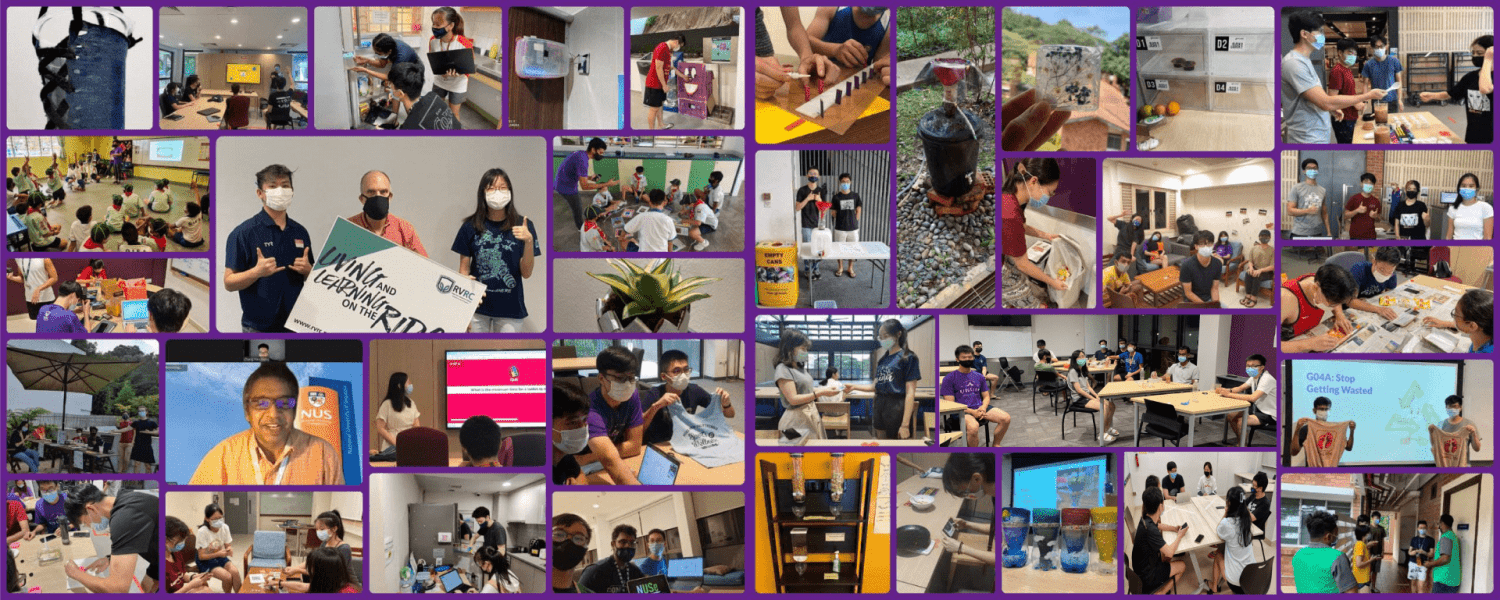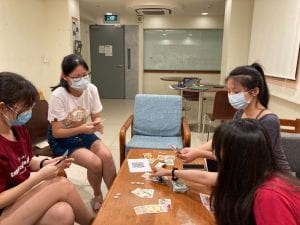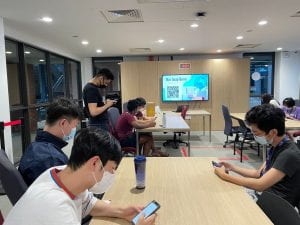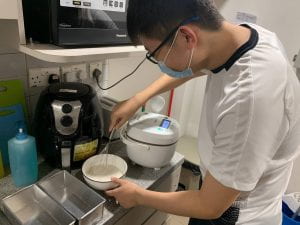RVRC has organized a sustainability symposium since the academic year 2015/2016, to showcase students’ projects from the module GEQ1917 to the RVRC community and beyond. During the symposium, students communicate their findings and deliberate with one another. Educators, industry partners, and government agencies are invited to attend the event to provide insights and feedback to the students. Starting in the academic year 2016/2017, the symposium took on the name Action for Sustainability, reflecting the college’s aspiration for the projects to tackle real sustainability problems in Singapore.
The RVRC Action for Sustainability Symposium 2021 was successfully held from 5th to 9th April 2021. Abstracts of this year’s projects can be viewed here.
Congratulations to the teams who won the awardsfor Outstanding Presentation, Best Project (Prototype), Best Project (Influencer) and Teamwork Excellence!
The GEQ1917 Teaching Team would also like to express our sincere thanks to NUS colleagues who have assisted the students with their project implementations in various ways!
- Mr. Low Kok Leong (OHS RVRC)
- Mr. Chan Kim Lim (OHS RVRC)
- Mr. Loo Deliang (OED)
- Mr. Harry Lim (OFM)
- Mr. Abu Shama Bin Samadi (OFM)
- Mr. Ravindran s/o Sockalingam (OHS, Emergency Management Division)
For more information on past symposiums, refer to:
Topic: Responsible Consumption
AY2021G21C- “Masks On Waste Off”
Improper waste disposal and high waste generation of disposable masks have spiked and adversely exacerbated environmental issues since the onset of COVID-19 both globally and locally. Educating and advocating for reusable mask usage would help reduce disposable mask waste.
We designed a face-to-face workshop comprising of i) a pre- and post-workshop and review survey; ii) distribution of free reusable masks iii) discussion of the benefits of reusable mask usage. Click here to find out more about the project.
AY2021G19B- “Reusable DIY cup-holders as sustainable alternatives to single-use plastic carriers”
The high volume of waste generated from single-use plastic carriers for takeaway drinks is a prevalent issue in Singapore. To mitigate this, we designed and test a DIY sustainable alternative for takeaway drink carriers for RVRC residents. Our cup holder prototype is made primarily from upcycled clothes waste. Click here to read more about the project.
AY2021G18C- “Bag&Go”
Both single-use plastic bags and tote bags pose significant environmental problems. From our pre-survey, we concluded that laziness and inconvenience were the main reasons that hampered our participants from reusing their bags. We designed and placed self-operating stands at two different locations on NUS campus. Our stands allowed both donation and taking of tote and plastic bags. Click here to read more about the project.
AY2021G17C- “Designing a rinsing device to reduce contamination rates in plastic recycling”
To decrease plastic contamination and raise awareness on the importance of rinsing plastics bottles/cups before recycling, the group placed rinsing devices near recycling bins to increase the convenience of rinsing plastics. Posters were also placed to educate users on the importance of rinsing plastics before recycling. Click here to find out more about their project.
AY2021G17B- “We Shell Reuse!”
The Reusable Bag Library, a reusable bag sharing initiative by NUS SAVE to reduce plastic waste, was largely underutilised and unsustainable. Our objective was to address the limitations and recreate the initiative to be more sustainable. We launched our project at UTown FairPrice with i) attractive booth and poster designs; ii) booths at each Utown Residential College; iii) labels with reminders of returning the bags, and iv) system to track usage of bags.
Click here to read more about the project.
AY2021G17A- “Paper Shroom”
Given that soiled paper packaging cannot be recycled, our project objective was to repurpose non-recyclable waste paper. We investigated optimal mushroom growing conditions to design an efficient DIY mushroom growing kit using waste paper bags from RVRC’s dining hall, and conducted a workshop to assess the resident’s receptivity towards these kits. Click here to read more about the project.
AY2021G14C- “Pantries against plastic”
To address the increase in plastic and microplastic waste creation in Singapore, the team hoped to encourage RVRC students to use more reusable containers when taking food, by improving the washing facilities in RVRC and conducting an educational campaign. Click here to find out more about their project.
AY2021G13C- “Project Plastick”
To raise awareness of repurposing as an alternative to disposing PET bottles. The group tried to do this by i) a repurposing workshop; ii) an exhibition of repurposed objects; iii) tutorial video and iv) Instagram account. Click here to find out more about their project.
AY2021G12C- “Save RV”
While environmental problems remain a serious issue, many people do not regularly practise sustainability. One of the reasons might be due to lack of knowledge. Our objective is to develop an educational board game for RVRC student participants, to reinforce their knowledge of sustainability and provide everyday solutions to environmental problems. We adopted the board game ‘Terra’ and conducted 3 gaming sessions.
Click here to read more about the project.
AY2021G10C- “Precious Plastics”
To promote plastic recycling, we utilized the unwanted plastics to create meaningful art pieces, visually reminding RVRC residents of the repercussions of excessive plastic wastage.
We hosted a hands-on art workshop complemented with other implementations; i) a pre & post-workshop interview and survey, ii) designated plastic-collection booths, iii) creation of a collaborative artwork, and iv) Instagram page for publicity. Click here to read more about the project.
AY2021G10A- “Feed People Not Landfills”
Wastage of food in communal fridges has been a persistent issue in Ridge View Residential College (RVRC). With convenience for residents in mind, the group implemented a multi-pronged approach of 1.) Food Sharing System (FSS), which comprised of labelling stickers to indicate food items that residents want to share and a telegram group chat to facilitate food sharing; 2.) Fridge-inventory mobile applications to remind residents of their food. Click here to find out more about their project.
AY2021G09C- “Bar Soap Bums”
The group aimed to encourage Singapore’s youths to switch from liquid soap to bar soaps to reduce plastic waste and carbon footprint. They delivered a 30-minute interactive workshop to address key concerns of bar soaps among the audience, a social media campaign to raise awareness on relevant issues, and a 3-week bar soap trial to help the audience form a habit of using bar soaps. Click here to find out more about their project.
AY2021G09B- “Project Deconsumption”
In Singapore, 1 in 3 people throw away clothes after wearing them just once. Our project aims to reduce clothing consumption by changing perceptions and purchasing habits amongst youths. We created an Instagram account to educate youths with regular posts highlighting a 21-day hands-on challenge, impacts of fast fashion and tips to reduce buying. Additionally, a workshop was conducted to educate our participants.
Click here to read more about the project.
AY2021G06C- “Grab & Dispose”
The group aimed to address this by providing an opportunity for waste segregation, so as to enhance the recycling rate in the RVRC dining hall. They installed separate recycling bins for drink cartons and sandwich packaging over three weeks. Click here to find out more about their project.
AY2021G05A- “BinBin”
The group aimed to reduce inappropriate and non-recyclable plastics in plastic recycling bins, which would in turn increase the success rate of plastic recycling in RVRC. They created a prototype bin which had a deterrence layer to reduce disposal of inappropriate plastics, and a filter that had a 98% success rate of retaining larger plastics, while eliminating smaller unrecyclable plastics. Click here to find out more about their project.
AY2021G04B- “COBRA-19”
The high usage and disposal rates of undergarments and masks bring about environmental consequences. Our group seeks to educate residents on the adverse impacts of bra and mask disposal and to repurpose unwanted bras into reusable bra masks.
We designed a 30-minute focus group discussion comprising (1) a pre-and post-discussion survey, (2) a time-lapse video, and (3) a discussion on the consequences of bra and mask disposal. Click here to read more about the project.
AY2021G04A- “Stop Getting Wasted”
Through a public awareness campaign (check out their promotional video here), group group aims to promote upcycling as a means of reducing plastic consumption. Our campaign has three phases – social media posts, educational workshops (learn to make tote bags here!) on upcycling old clothes to tote bags as a plastic alternative, and a pilot study to gauge the effectiveness of our campaign. Click here to read more about the project.
AY2021G03A- “ZeroWasteRV”
Given that RVRC residents do not reuse ecommerce cardboard boxes, the group’s objective was to implement a two-part system to encourage its diversion away from the waste/recycle stream, into the reuse stream. Click here to find out more about their project.
AY2021G02C- “Give Trash a Second Life”
The group’s objective was to raise awareness of upcycling single use drink containers among NUS students. They designed a website and conducted a 40-min online workshop with surveys. Click here to find out more about their project.
AY2021G02A- “Drop the Beads”
To raise greater awareness concerning the detriments of microplastics, the team put up posters elucidating the deleterious effects of microplastics and conducted a giveaway for microbead-free DIY facial scrubs, complemented by informative e-brochures and videos (check out their tutorial here!) expounding on the ease of making said scrubs. Click here to find out more about their project.
AY2021G01A- “PlinkoBingo”
To motivate environmental protection, the team designed an interactive Plinko board comprising of colourful elements and lights that users may drop their bottle caps into, to promote the uncapping and emptying of bottles in a fun and engaging manner. Click here to find out more about their project.
Topic: Energy
AY2021G20A- “Eco-Soap Bar: The Building Blocks of a Sustainable Habit”
To mitigate the high environmental footprint of liquid soap, the group aimed to raise awareness about the negative environmental impacts of liquid soap and promote the use of bar soap as an alternative. Click here to find out more about their project.
AY2021G14D- “Project Green Voices”
AY2021G13A- “Cool2dry"
Electrical dryers consume substantially more energy than other household appliances. We aim to reduce the electrical consumption of dryers by educating RVRC residents on its high consumption through informative platforms – Instagram, stickers on dryers and posters, and to discourage high heat usage by using lower heat. Click here to read more about their project.
AY2021G05B- “Enabling Energy Saving Mode: Why Waste When You Can Save?”
Topic: Water
AY2021G21A- “Stop the Drop!”
To address Singapore’s high levels of water consumption, we developed a prototype that provides the option to funnel cold water from the shower into a bucket. This is to encourage collection of cold water which are wasted while waiting for the water to warm up before RVRC residents’ shower. Click here to read more about the project.
AY2021G19C- “NUSe”
To raise awareness on the importance of reducing solid waste and to provide useful means to do that, the group created and tested a digital platform to promote the sharing or donation of hostel essentials amongst NUS campus residents. Click here to find out more about their project.
AY2021G19A- “Fridge View”
Within RVRC, accumulation of unaccounted and expired food in refrigerators produces large amounts of food waste. Our objective was to enhance the current food labeling system in RVRC fridges through digitization. We implemented a Telegram bot that i) logs items placed into fridges, ii) reminds users near expiry, and iii) stores a database of shared food items that users can access. Click here to read more about their project.
AY2021G12D- “Not Full Load? Please Unload!”
Laundry contributes to a huge amount of water usage globally, yet many do not do their laundry on full load. In order to fulfill the objectives of raising awareness and nudging changes in laundry habits, we implemented i) a pre- and post-survey; ii) an educational poster; iii) a weighing scale for residents to assess and increase laundry loads over time, and iv) a focus group discussion. Click here to read more about the project.
AY2021G08A- “Time the Flow”
Realizing that simply raising awareness is ineffectual in enacting changes in showering habits of RVRC residents, our objective was to develop an audio-visual reminder that actively alerts users to stop showering within a stipulated time. We installed a shower-alarm device that activated a combination of flashing LEDs and an alarm buzzer. Click here to read more about their project.
AY2021G01B- “dr. stRAINge”
Water security is an essential issue in Singapore. Given that rainwater is highly accessible in Singapore, we propose to use rainwater as an alternative water source. We designed a rainwater harvester that filters, stores and dispenses rainwater. We executed a trial where cleaners would dispense the collected rainwater for mopping Block C’s ground floor. Click here to read more about their project.
Topic: Food
AY2021G18A- “CODE: Plastic Junior”
Lack of awareness of proper recycling methods is a key factor in Singapore’s low recycling rate. Hence, inculcating knowledge about plastic recycling is important, especially at a young age, to enhance the recycling rates in the long-term. Therefore, the team created and tested a card game for children aged 9-12 years, to enhance their knowledge of plastic recycling. The game was part of an interactive workshop conducted in a school setting with the target age group. Click here to find out more about their project.
AY2021G17D- “Welcome to the Bread Bank”
The project aims to reduce rice wastage at RVRC dining hall by upcycling the unserved rice into a desirable consumable product for RVRC students. The team formulated an easy-to-follow recipe to produce tasty bread made from white and brown rice, and proposed the recipe to the dining hall caterers for serving during breakfast. Click here to find out more about their project.
AY2021G15D- “Ugly Fruits? Just Juice!”
To reduce fruit wastage, the group aimed to shift RVRC students’ consumer demand for ugly fruit. This will encourage Dining Hall vendor to minimise fruit wastage and in turn, fruit suppliers, in the future. Click here to find out more about their project.
AY2021G15C- “RV-UPs!”
With the extensive generation of used beverage cartons (UBCs) globally and the inefficient UBCs recycling system in Singapore, it is crucial that the end-of-life of these packages is addressed appropriately. The team conducted interactive educational sessions where RV residents are able to learn and adopt upcycling in their daily lives. Click here to read more about the project.
AY2021G15B- “Reducing Food Wastage through Proper Fridge Management in RVRC”
As increased awareness of food left in fridges can reduce food wastage, so the group aimed to make food stored in RVRC’s fridges easily trackable while increasing users’ awareness of when their food expires. Click here to find out more about their project.
AY2021G15A- “Unwrapped”
To tackle waste management with single-use packaging, we tested the feasibility of a long-term zero-waste snack store in NUS. Our store was then operated for 4 weeks in RVRC. It was unmanned, sold loose snacks sourced from zero-waste suppliers, and required customers to use their own containers at purchase. Click here to read more about their project.
AY2021G13B- “Clean Plate Club”
Food wastage has been a persistent problem in RVRC. The group aimed to investigate the effectiveness of peer support on encouraging students to reduce their plate wastage. Click here to find out more about their project.
AY2021G11A- “Serious Chillers”
Air-conditioning is widely used in Singapore due to the year-long hot weather. However, air-conditioner requires a large amount of energy and is the second highest source of greenhouse gas emissions in Singapore. To tackle the lack of accessible substitutes to air-conditioning, the team developed an alternative cooling solution to help nudge users to work in a warmer environment.
They created an eco-friendly air-cooler using reusable materials, and reached out to youths via a i) 5-day challenge for user acceptance and ii) DIY workshop for experiential learning. Click here to find out more about their project.
AY2021G06D- “Famyshd”
The group aimed to reduce these categories of food waste. They installed a central collection point at two pantries, supported by a Telegram Bot and channel, for residents to share food in a timely manner instead of disposing it. Click here to find out more about their project.
AY2021G03B- “CONWASH-21: Wash Your Troubles Away”
To address the inconvenience of washing the lunchboxes by hand, the team designed and tested a dishwasher prototype as a more convenient alternative. First, they measured the prototype’s effectiveness based on three key design criteria: hygiene, time required to wash, and water consumption. After making required design adjustments, the team invited RVRC residents to test the prototype. Click here to find out more about their project.
Topic: Natural Environment and Ecosystem
AY2021G21D- “Creature Comforts”
The loss of habitat forces wildlife into urban areas, leading to human-wildlife interaction. With RVRC located next to the Kent Ridge forest, there is higher likelihood of such encounters. To educate RVRC residents to respond in such encounters, we provided the information required in handling such interactions. QR codes were pasted on residents’ doors. If residents encounter animals in their rooms, they can scan to obtain instructions on safe handling of wildlife.
Click here to find out more about their project.
Topic: Built Environment and Green Infrastructure
AY2021G20C- “COOL VIEW”
The group examined the impact of 3M solar films in enhancing occupants’ thermal comfort and lighting conditions in RVRC tower block. Click here to find out more about their project.
Action for Sustainability 2021 webpage created by Teo Rui Juan and Miguel Lim















































































































